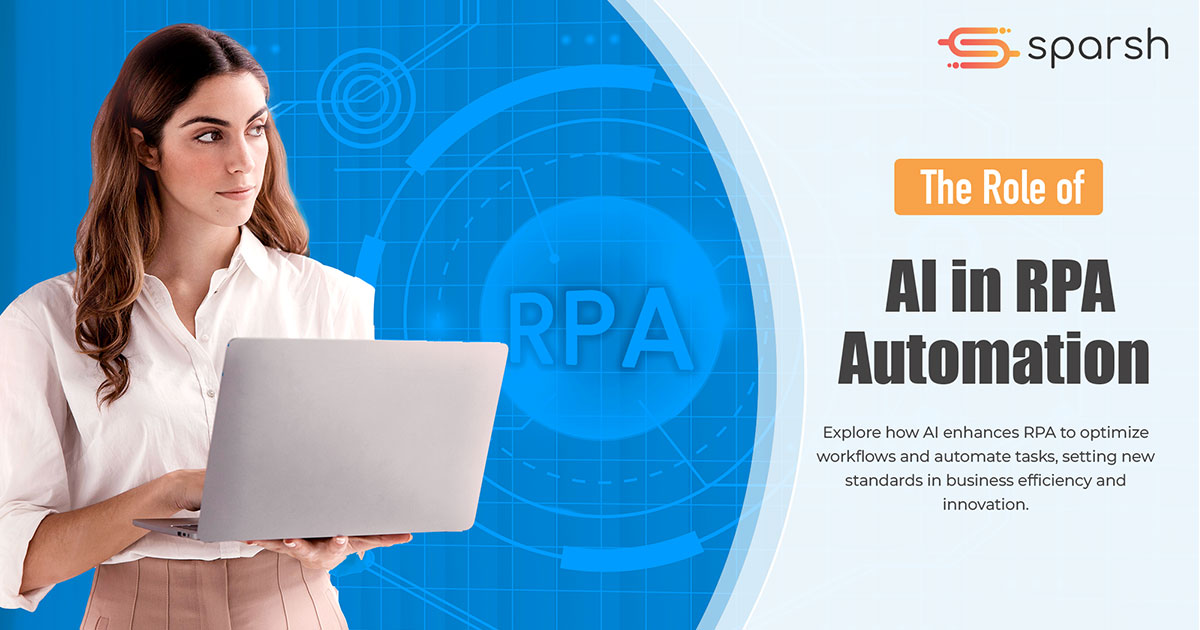The Role of AI in RPA Automation
 1. Introduction
1. Introduction
Businesses are continuously looking for methods to cut expenses and increase efficiency in the fast-paced world of today. One of the most significant advancements in this quest is the combination of Artificial Intelligence (AI) and Robotic Process Automation (RPA). It is transforming workflows across various industries, from manufacturing and education to retail and e-commerce. This article explores how AI and RPA are revolutionizing business processes and the benefits they bring.
2. Rise of Robotic Process Automation (RPA)
In the quickly evolving business landscape, robotic process automation, or RPA, has emerged as a transformative force. RPA automations streamline repetitive tasks, enhance efficiency, and reduce operational costs. The rise of RPA has revolutionized industries, making processes faster and more accurate, thus allowing human workers to focus on more strategic tasks.
3.Key Components of RPA
- Bots: Bots are the backbone of RPA. To carry out repetitive tasks, these software robots imitate human movements. Whether it’s data entry, invoice processing, or inventory management, bots handle it all with precision and speed, reducing the risk of human error.
- RPA Software: Robotic process automation software, such as those from leading providers like Microsoft RPA and Automation Anywhere, enables businesses to deploy, manage, and optimize their RPA solutions. These platforms offer a range of tools and features that cater to different automation needs, from simple task automation to complex workflow automation.
- Workflow Design: A well-designed workflow is essential for an RPA deployment to be successful. It involves mapping out processes, identifying automation opportunities, and creating workflows that maximize efficiency. Workflow automation tools play a vital role in designing and managing these processes.
- Integration: Seamless integration with existing systems is essential for RPA to deliver its full potential. RPA tools must be able to integrate with various software applications, databases, and other digital systems within an organization to ensure smooth and uninterrupted operations.
4. The Rise of Artificial Intelligence (AI) in Automation
Artificial intelligence (AI) is reshaping the automation landscape. By adding cognitive functions, also referred to as RPA, combined with AI, it enhances the capabilities of traditional RPA. This means that AI can analyze data, make decisions, and even learn from past experiences, making RPA solutions smarter and more adaptable.
5. Understanding AI-powered RPA
AI-powered RPA combines the strengths of AI and RPA to create powerful automation solutions. While RPA handles repetitive tasks, AI adds a layer of intelligence, enabling the automation of complex processes that require decision-making and pattern recognition. By working together, companies can increase overall productivity and automate a wider range of tasks.
6. Understanding Process Automation and Its Benefits
Robotic process automation, also known as RPA, is the process of automating repetitive, rule-based tasks using software robots, or bots. Many tasks, including data entry, invoice processing, customer support, and inventory management, can be handled by RPA automations. Businesses that implement RPA software can achieve:
- Increased Efficiency: RPA tools work tirelessly, speeding up processes and ensuring consistent output. As a result, production cycles are accelerated, and the time to market for products is shortened.
- Cost Savings: Automating routine tasks reduces the need for manual labor, leading to significant cost savings. It also minimizes errors, reducing waste and rework.
- Scalability: RPA solutions are highly scalable. As a business grows, automation can be expanded to accommodate increased workloads without additional strain on resources.
- Increased Quality: Automation guarantees accuracy and consistency, which results in fewer faults and better-quality products. Customers are happier, and there are fewer returns as a result.
- Data management: RPA is capable of handling enormous volumes of data and can deliver real-time analytics and insights to support more informed choices and well-thought-out strategic plans
7. The Amazing Impact of AI and Robotic Process Automation on Workflow
The integration of AI with RPA, often referred to as AI-powered RPA, takes automation to a new level. While RPA excels at handling repetitive tasks, AI adds cognitive capabilities, enabling machines to learn from data, recognize patterns, and make informed decisions. This combination is revolutionizing workflows in several ways
- Enhanced Decision Making: Massive data sets can be analyzed by it to spot patterns and anticipate future events. For instance, in the manufacturing industry, AI can predict equipment failures by analyzing historical data, allowing for preventive maintenance and reducing downtime. Saving money and improving operational efficiency are the results of this.
- Improved Customer Experiences: In retail and e-commerce, AI and RPA can provide personalized customer experiences. AI algorithms analyze customer behavior and preferences, allowing businesses to offer tailored recommendations and promotions. RPA automations handle order processing, inventory management, and customer inquiries, ensuring a seamless shopping experience.
- Streamlined Administrative Tasks: Administrative duties like student enrollment, grading, and scheduling can be automated in the education sector with its help. This reduces the administrative burden on educators, allowing them to focus more on teaching and student engagement. AI can also provide information about how well students are performing, which helps teachers identify areas where their students need to improve.
- Optimized Supply Chain Management: AI and RPA can optimize supply chain management by forecasting demand, managing inventory levels, and identifying the best suppliers. By doing this, you can minimize stockouts and overstock situations and guarantee that products are available when needed. More efficient production and distribution processes result for manufacturing and automation companies.
- Intelligent Automation: It combines multiple technologies, including machine learning, natural language processing, and computer vision, to handle complex tasks. This hyperautomation enables end-to-end automation of business processes, reducing the need for human intervention and increasing overall efficiency.
8. Practical Applications of AI in RPA
AI and RPA are being applied in various ways across industries:
- Manufacturing: Manufacturing streamlines production processes, optimizes supply chain management, and enhances quality control. For instance, it can predict machine failures before they happen, reducing downtime and maintenance costs.
- Education: It can automate administrative tasks such as student enrollment, grading, and scheduling, allowing educators to focus more on teaching and student engagement.
- Retail and E-commerce: Retail and e-commerce businesses benefit from it through enhanced inventory management, personalized customer experiences, and efficient order processing. Automation helps in analyzing consumer behavior and preferences, leading to better-targeted marketing strategies.
9. Conclusion
The future of workflow is undeniably intertwined with AI-powered RPA. As businesses continue to embrace these advanced technologies, they can look forward to unprecedented levels of efficiency, cost. savings, and innovation. The manufacturing sector is set to usher in a new era of growth and productivity thanks to the utilization of AI intelligence, workflow automation tools, and RPA automation software. growth. The manufacturing sector is set to usher in a new era of growth and productivity thanks to the utilization of AI intelligence, workflow automation tools, and RPA automation software.
10.Call to Action
Are you willing to transform your business processes with an AI-powered RPA? Contact us today to learn how our cutting-edge automation solutions can help your business achieve new heights of efficiency and innovation. Let us show you the route through the future of workflow automation.









